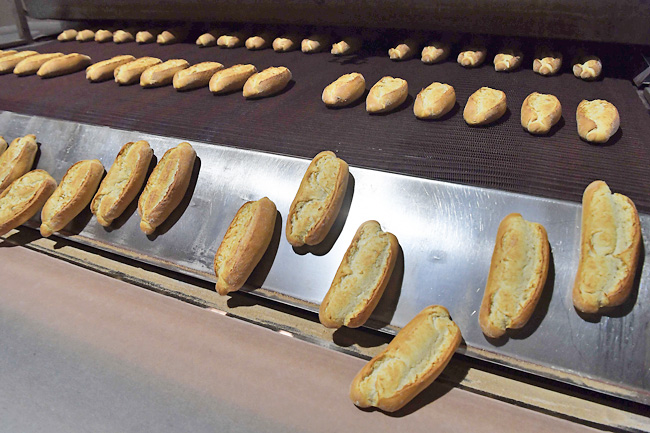Zeynep Cermen
ISTANBUL (XINHUA) – At a big bread factory in Istanbul, the production line was running at full steam as the machines kneaded the dough in huge pots, shaped it on the conveyer belt, and baked pieces of bread in the ovens.
“There is a huge increase in demand for public bread right now due to the soaring bread prices in the city,” Harun Celebi, a shift supervisor at the Istanbul Halk Ekmek (IHE) Cebeci plant in the Sultangazi district, told Xinhua while checking the baking degree of pieces of bread in a giant oven.
IHE, or Istanbul Public Bread, a subsidiary of Istanbul Metropolitan Municipality, has been producing regular bread and baked products at affordable prices for the public since its foundation in 1978.
The institution has recently taken a series of measures to meet the increasing demand of Istanbulites for affordable bread, increased the efficiency of the lines of its three factories, and inaugurated a new plant to better cope with the growing demands.
IHE has managed to increase its daily production capacity from 1.5 to 1.8 million of regular bread. With more than 3,000 sales points, the institution currently meets 12 per cent of Istanbul’s bread needs.
At the beginning of July, the price of 210 grammes of normal bread produced by private bakeries in Istanbul rose from TRY3 to TRY4 (USD0.22), marking the third hike since November 2021. IHE currently sells 250 grammes of bread for TRY2. The price of a normal IHE bread was TRY1.25 in February.

Head of IHE Okan Gedik told Xinhua in a recent written interview that due to the recent hikes in bread prices in the city of over 16 million people, the demand for public bread has increased significantly.
“As a result of rising energy expenses, commodity prices, labour cost, and exchange rate effects, we are faced with a serious cost increase in every field in our country,” he said.
“The geopolitical risks in the region, which is very important for world grain production, has made the situation even riskier,” said Gedik, referring to the grain export from Ukraine amid the ongoing crisis.
“In particular, agricultural input costs showed an increasing course above all times,” he pointed out.
To prevent these price hikes, IHE has been trying to make long-term, cost-fixing contracts with its suppliers as much as possible, according to Gedik.
“Additionally, we launched a direct purchasing programme from our farmers to encourage wheat farming in the province of Istanbul,” he remarked.
His institution also focussed on internal processes and efficiency studies to create savings opportunities.
Türkiye is facing a 78.62 per cent annual inflation in June, which has put a massive burden on people.
The Turkish currency lira (TRY) lost 45 per cent of its value against the US dollar in 2021 and another 25 per cent this year.
Bread has become the most important food item for the low-income group in the country.
People frequently stage long queues to buy bread at affordable prices in front of IHE kiosks.






